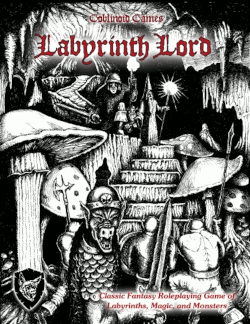 Labyrinth Lord Revised Edition | |
| Designers | Daniel Proctor |
|---|---|
| Publishers | Goblinoid Games |
| Publication | 2007 (original); 2009 (Revised Edition) |
| Years active | 2007-present |
| Genres | Fantasy |
| Playing time | Varies |
| Chance | Dice rolling |
| Skills | Role-playing, improvisation, tactics, arithmetic |
| Website | https://goblinoidgames.com |
Labyrinth Lord (LL) is a fantasy role-playing game written and edited by Daniel Proctor and published by Goblinoid Games. It emulates the rules and feel of Dungeons & Dragons (D&D) using the Open Game License (OGL) from Wizards of the Coast. LL is based on the 1981 D&D Basic Set edited by Tom Moldvay and its accompanying Expert Set by David "Zeb" Cook. [1]